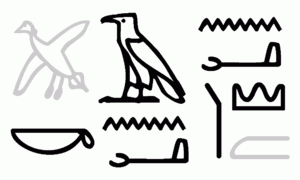Canaan
![]()
This article explains the land of Canaan; for other meanings, see Canaan (disambiguation).
Canaan (Northwest Semitic kn'n, Alalach ki-in-a-nimKI, Akkadian LUki-na-aḫ-numMEŠ, Assyrian KURki-na-aḫ-ḫi and KURki-na-ḫi, Babylonian KURki-na-ḫa-a-a-u, Hurrian KURki-na-a-aḫ-ḫi, Hittite KUR URUki-na-aḫ-ḫa, Arabic کنعان (Kanʿān), Hebrew כְּנַעַן (Kena'an), Egyptian p3-k-3-n-ˁ-n-ˁ, Phoenician Kenaʻ, Ancient Greek Χαναάν Chanaán) was used in antiquity mainly to designate the southwestern Syrian region, and from the end of the 2nd millennium BC onwards it was used as a name for the region. Millennium BC extended to the area of Palestine (Pleschet).
The use of the name Canaan is still attested under Seleucus I, who called himself "the L'dk' in Canaan". The Roman occupation replaced "Canaan" by the designation Syria, whose borders neither corresponded to the extent of the former Canaan nor to the borders of modern Syria.
.jpg)
Approximate extent of the land designated as Canaan/Kinaḫḫu around 1300 BC.

The name Canaan appeared in Egyptian hieroglyphics as k3nˁnˁ on the Merenptah Stele in the 13th century BC.
Etymology
The exact interpretation of the name Canaan remains unclear. In Egyptian texts, the name Canaan is usually associated with negative titles: "robbers and Canaanites, rebellious inhabitants in Canaan".
The derivation from the later Aramaic, Hebrew and Arabic languages using the root kn' allows the interpretations: "the bending, the bent, the bowed, the humiliated, the outcast, the subjugated" and "the withdrawn".
Search within the encyclopedia